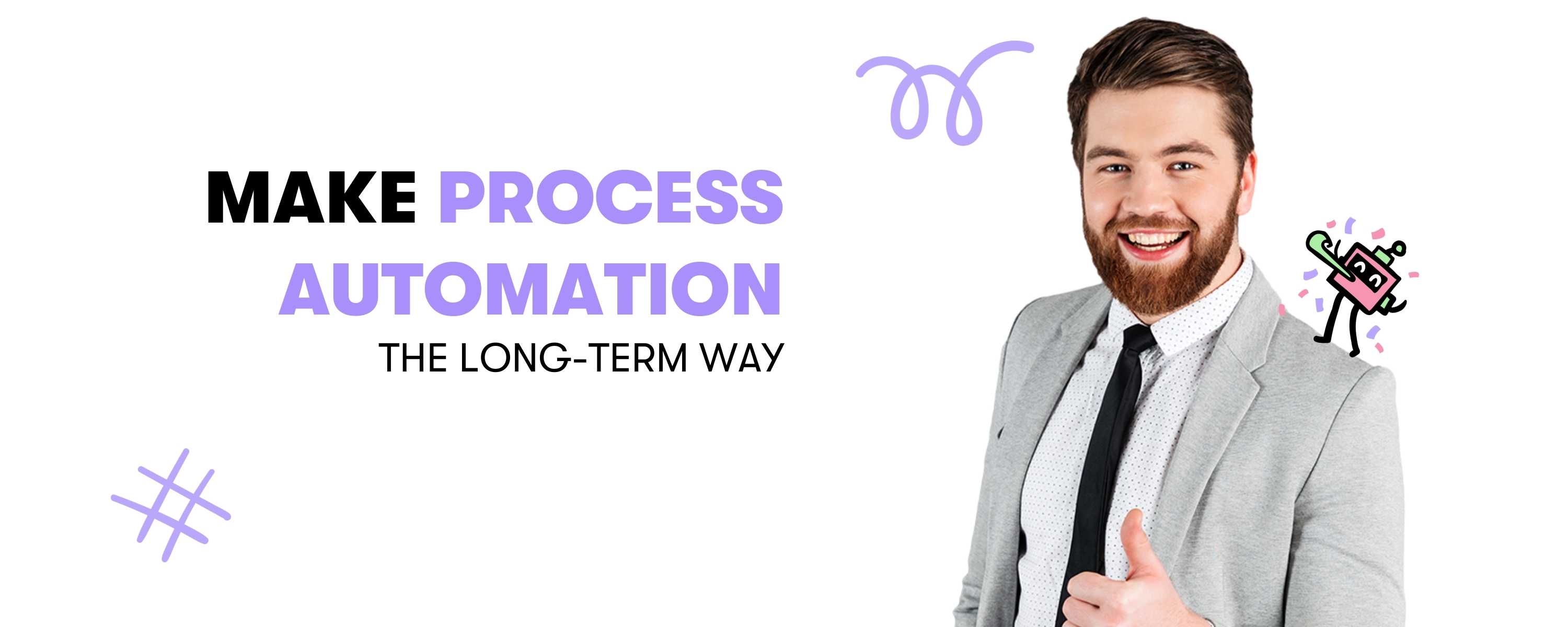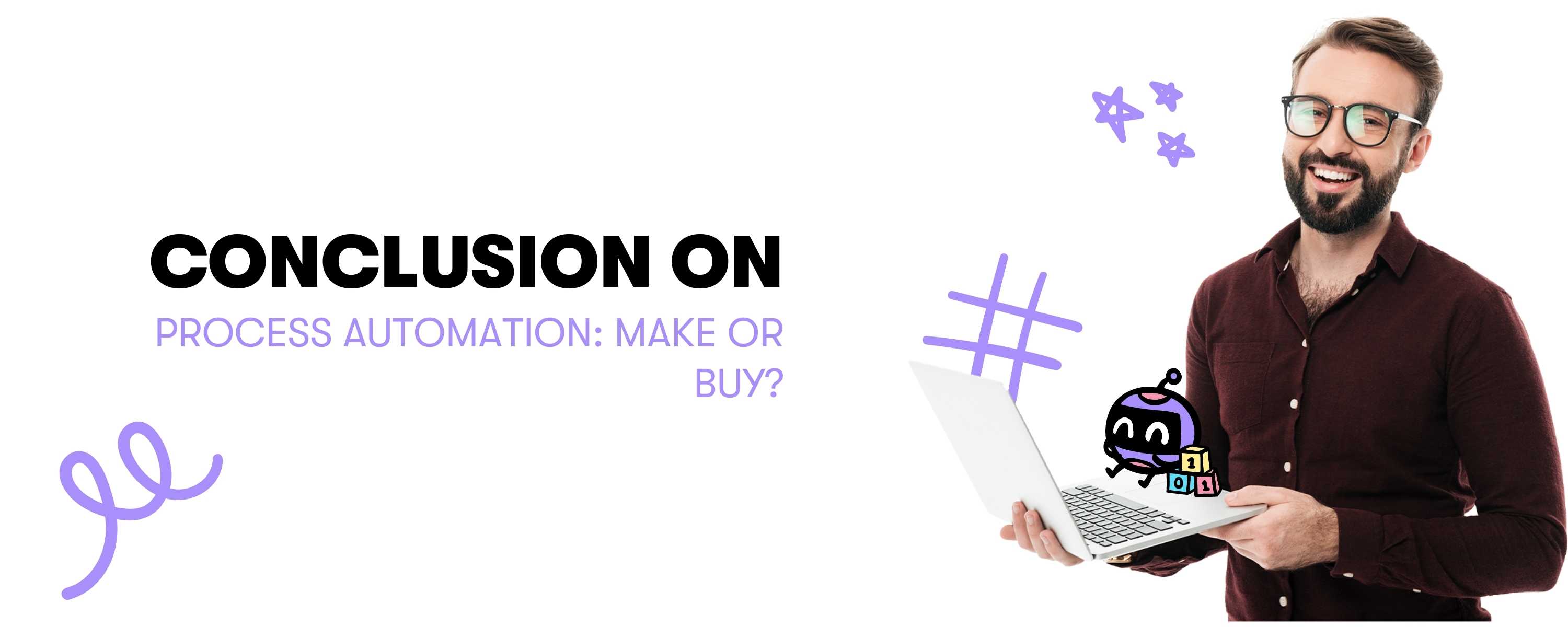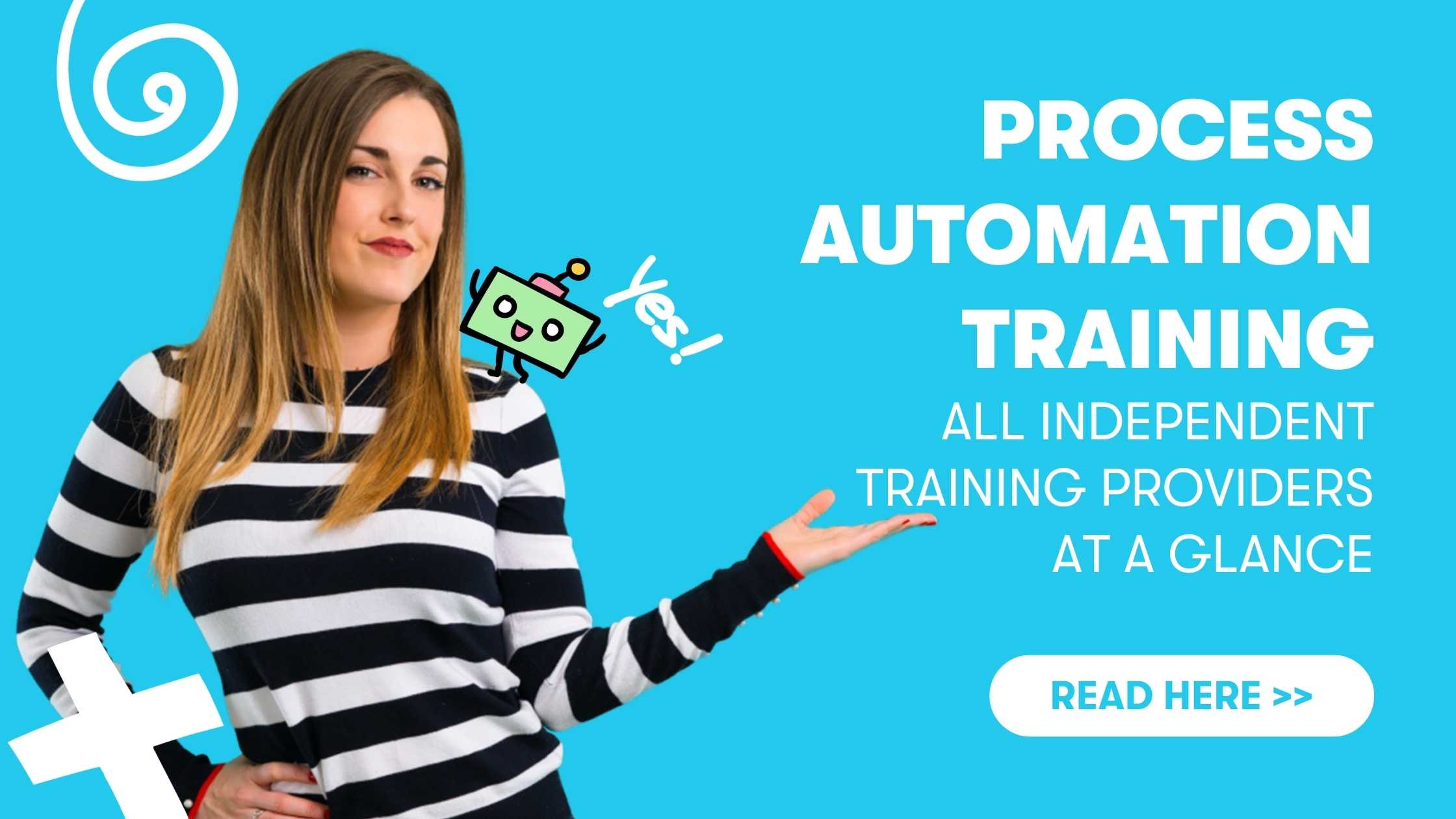Although companies have understood the importance of technologies such as Robotic Process Automation (RPA), Process Mining or even cloud automation with iPaaS for re-engineering and optimizing their processes, there is still uncertainty in many cases about the best approach. It is not enough to plan an RPA solution or the like only for extracting, sorting or copying data. This kind of automation thinking does not do enough justice to the efficiency concept behind process automation. Rather, what is appropriate is a holistic understanding of how automation can be integrated into existing workflows and the operational platform in a meaningful and profitable way. Whether you have a large or small business looking for an automation solution, you need to address the question: Process Automation Make or Buy.
In this blog post, we will therefore look at the most important factors to consider to help you make the right choice: Do I hire a consultancy to automate my processes or do I take automation into my own hands? You could generalize and say that the obvious thing to do is to automate simple processes yourself and leave the automation of more complex processes to external experts. But that is too short-sighted.
Process Automation: Make or Buy?

Buy: Process Automation as a Quick Win
Outsource what you can't and let professionals in their field do the work - this is the approach behind the idea of buying process automation externally. The decision to work with a process automation consultancy does have its advantages for organizations. When embarking on a new initiative, especially a complicated one, it is very time-consuming and requires special expertise to honestly assess existing capacities and organizational capabilities.
An ideal partner has extensive general process knowledge and understands the details of an organization's processes in order to optimize them prior to automation. Experienced partners have built up relevant expertise in RPA, process mining or even iPaaS and can contribute lessons learned from failures and successes to make the automation initiative as smooth as possible. Extensive experience with, for example, the leading RPA Tools, iPaaS solutions or Process Mining vendors can also ensure faster development cycles, reducing time-to-market. High-quality partners know exactly how the additional use of complementary technologies such as artificial intelligence or machine learning to a solution can sometimes deliver even better results (keyword: Hyperautomation). Proven process and automation experts document every step of the process mapping to clearly identify RPA favorites and avoid costly misses. In addition, consultancies with proven business knowledge have experience in positioning the investment to serve the company's overall strategic and business objectives.
Buying in external expertise frees up employees to concentrate on what they can already do, while others optimize processes for them. Instead of getting involved in complicated technical details, experts take over the task and are much more efficient at it - at least that's the theory. For companies, this means outsourcing components where the suppliers or service providers have a comparative advantage, for example through lower cost structures or greater expertise.
The argument in favor of outsourcing automation is that it saves resources for the core business and possibly leads to better automation results - at least for the time being. Many companies therefore take this route and hire expensive consulting companies to automate individual processes. In this context, the Automation Consultant should be mentioned, which is increasingly coming to the fore and has fully focused on the topic of process automation in terms of consulting.
Not all that glitters is gold
But where there is light, there is also shadow: once again, apart from the fact that you have to assess the partner's level of expertise and knowledge, both in terms of process automation and in terms of his process knowledge, you must not underestimate the cost factor. Companies buy a service that they don't really know if their expectations will be met when they sign the contract. External service providers can automate specific processes well, but it is much more difficult to optimize the entire value chain and thus map the entire workflow. Once the complexity of managing an installation grows exponentially with the number of bots, processes, and process exceptions, many providers struggle to scale automation beyond the initial proof of concept (POC).
This is a dangerous situation, because process automation is a disruptive technology that can significantly damage the functioning of a company if implemented incorrectly. In addition, the use of an external service provider can be expensive fun, because it sometimes takes a lot of time to explain all the workflows and processes to an external consultancy that is not one hundred percent technologically savvy. Smaller or medium-sized companies in particular that want to become digital pioneers can rarely afford expensive consulting on a large scale. Furthermore, it should not be forgotten that once the contract is signed, the knowledge disappears from the company just as quickly as it came. So anyone who wants to plan for the long term will reach their limits here.

Make: Process Automation thought out for the long term
The alternative to the consulting firm is to tackle automation internally. The most obvious advantage of the do-it-yourself approach to process automation is the lower investment, e.g. the license fees for the various automation tools (iPaaS solutions in particular shine here). But also the conviction that no one knows the company's processes better than the company management and the specialist departments makes the idea mature in many companies to take the automation of processes into their own hands and to manage the bots directly themselves, thus not giving up access to their own data, systems and infrastructure.
This sense of control and protected access is a driving factor for many companies that take a do-it-yourself approach to automating their processes. Owning the intellectual property of the bots used is another advantage of this approach. The knowledge remains within the own company and can be evaluated in the best possible way - you know your processes best yourself.
This does not mean that you have to get ten programmers and IT experts on your team - employees can also acquire the know-how for process automation themselves. However, googling once is not enough to automate a company sustainably. Various Digitalization Academies specialize in training companies and their employees in the field of automation. Educating them further not only benefits their job profile, but also the company itself. The training courses are cheaper and more sustainable compared to hiring external companies for automation. And even if you decide to use external providers, building a team is a great added value for maintaining, scaling or modifying your automation solution.
In order to implement future-oriented automation in the company itself, extensive knowledge of business processes and current automation tools coupled with the knowledge of how to apply these in the right IT context is required at the interface between specialist knowledge and automation - in addition to an Automation Mindset. For this purpose, the Automation Agent, for example, is a combination of business process management and automation professional.
Small insertion: Automation Academies such as Bots & People offer flexible online courses, e.g., Automation Strategist and Automation Champion training. This approach deviates from the conventional monolithic, one-dimensional understanding of RPA training with a very strong product focus. In addition to imparting the necessary automation mindset and extensive know-how in the areas of business process management, process mining, robotic process automation, workflow automation in the cloud (iPaaS) and change management, all-rounders are trained here who can analyze and evaluate processes in order to ultimately automate them. These trainings do not require much prior knowledge and take just 8 weeks.
Low Code / No Code automation solutions support companies in their efforts to automate their processes themselves. With them, almost any employee with little or no coding skills can theoretically design and build a complex business solution for his or her company single-handedly. And they can do so at a fraction of the cost of hiring expensive developers or hiring an outside firm to handle the design and development responsibilities.
Center of Excellence (CoE)
With an Automation Strategist and a No Code solution, you have already laid the foundation for automation in-house. Those who decide to ramp up automation internally can now form a "team of experts" for this task. Ideally, the automation know-how available internally is bundled in a Center of Excellence (CoE).
Tasks of the CoE are...
- Analyze and map the company's processes and discover inefficiencies,
- decide which processes should be automated and develop a strategy,
- processes and to optimize them by means of automation,
- to make the flow of information more transparent.
Clear responsibilities mean that Process Automation can be tackled directly and put into concrete terms. A Center of Excellence is a starting point for the development of Digital Transformation. However, the approach is more suitable for the realization of long-term goals. You can and should start small. Training employees and automating coordinated processes need be neither complex nor expensive. Nevertheless, it makes sense to keep a competence center in mind. Responsibilities for automation tasks should be clearly assigned right from the start.

Process Automation Make or Buy: Long-Term Benefits & Quick Wins
There is no one right way to go about process automation and no sample solution for the question "Process Automation make or buy?". For some, the advantage of not having to invest time in process automation themselves may outweigh the disadvantages, while others prefer to educate themselves and automate sustainably themselves. Which strategy is better depends on the structure of your company and your own preferences.
However, you should always keep in mind that process automation is highly scalable, so while it's important to think bigger, it can still make sense to approach automation one step at a time. Be clear about how process automation integrates with your existing workflows and legacy systems. After all, in addition to complexity and available resources, the speed at which you need to deploy an automation solution and achieve initial real results certainly plays a role in the "process automation make or buy" question. Nevertheless, if you are looking to the future and striving for Hyperautomation, it can only be advantageous to build up know-how yourself in the company at an early stage.






-%20How%20to%20make%20your%20company%20successful.png)


